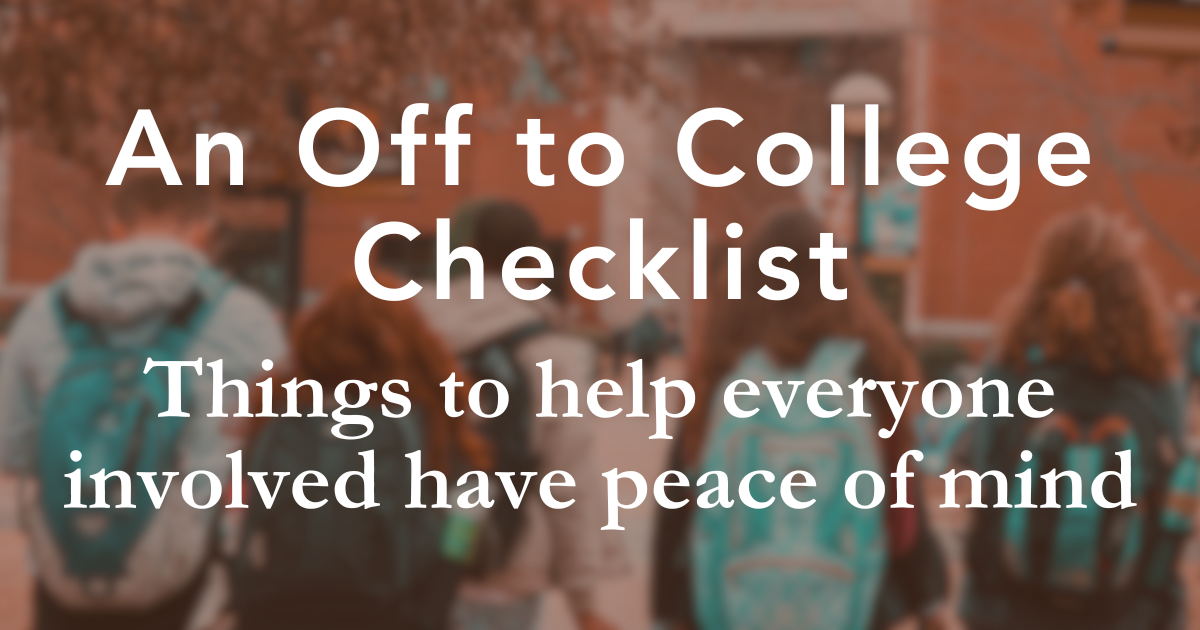The Wall Street Journal recently ran two articles about getting kids ready for college. The first one was a discussion of the important documents you need to have. The second one listed some products your student might find helpful. I don’t mind standing on others’ shoulders, so it’s in that spirit that I present summaries of the two articles.
The first list is the more important of the two. It lists six important documents you need to have.
Document #1 – HIPAA release form
As you probably know, when your child turns 18, you, as a parent, lose access to their medical records.
With a universal HIPAA form, parents can do something as simple as obtain a copy of U.S. lab work results for a child on an overseas program. It can also be important for situations when parents are far away and need information on their child’s care. A universal HIPAA isn’t limited to a single provider; it’s not the same form your young adult may have signed at an individual doctor’s office.
The article recommends checking out the American Bar Association’s sample form.
Document #2 – Healthcare proxy
This is the document that lets a parent make medical decisions on behalf of an incapacitated adult child. The article cites the example of a parent whose son was admitted to the ER and ended up needing a spinal tap 😳. She promptly got the healthcare proxy afterward. The article says these can be found online or obtained from an attorney. AARP maintains free, state-specific healthcare directives on its site here.
Document #3 – Living will
Next the article goes to a topic we’d all like to avoid, but which we can’t. Your child needs a living will to dictate what level of life-sustaining care they will be given, such as ventilator, feeding tube, etc 😳😳. Sadly, you need to know what to do in a life-or-death situation–and you need to honor your child’s [last] wishes. Again, AARP to the rescue (same website as above.)
Document #4 – Durable power of attorney for finances
If your child is hospitalized, someone needs to continue to pay his or her bills, like rent and car loans. While you might be able to do this if you have passwords to your child’s financial accounts. The article says that that might even violate “a provider’s terms of service.”
Having a durable power of attorney can be a way to step in and help without having to seek judicial permission to act on the child’s behalf. There are different kinds of financial powers of attorney, and laws vary by state, so families should consult an attorney about what works best for their situation. And there are varying schools of thought about how much authority a young adult should give to a parent. Some durable powers of attorney take effect only in cases where the child is considered disabled due to reasons such as mental illness, physical illness or chronic drug use. Others take effect immediately upon signing.
Document #5 – Health insurance
While young adults typically can stay on their parent’s health-insurance plan until they are 26 years old, some families, for cost or other reasons, may choose to purchase a school’s insurance plan instead. In these cases, parents might want to consider having access to the plan if they want information on billing and coverage.
Document #6 – FERPA waiver
Even if you’re paying your child’s tuition, you have no access to their academic records, including disciplinary records. For all of that, you’ll need a FERPA waiver. Check with the school for its version of the form.
For a more interesting list but one that might not be as critical, continue reading. This is the list of college survival gear.
Item #1 – Laptop sleeve
Get one to protect your child’s laptop, which you probably bought for them. The article recommends the Nillkin Laptop Sleeve, which it says, “will repel water and shield a computer from an accidental knock off the table.” This model also doubles as a laptop stand. Visit Nillkin.com.
Item #2 – Shower tote
I think it’s super nasty to be standing barefoot on the same concrete floor 100 other people just stood on. That’s just gross, so a pair of flipflops might be handy. The WSJ suggests a tote to haul all the stuff down the hall way to the nasty shower area. They recommend the Room Essentials Mesh Caddy from Target.com.
Item #3 – Your mother
Actually, not your mother – that would be great…or maybe not. Instead of your mom saying, “now, just retrace your steps. Where did you set it down,” you can just buy Apple Airtags so later you can find where you left your keys or other vital items. Go to Apple.com to buy a set.
Item #4 – A computer dongle
While Apple gear is clearly superior to Windows gear, not everyone agrees, and you may be forced to use something more primitive than USB-C. For that, you need a USB adapter, such as the Anker 55 USB-C Hub, which is available at Anker.com. I can’t vouch for this particular one, but I have an Anker hub connected to my MacBook Pro now.
Item #5 – An online organizer
The article suggests using Notion, which is recommended by a current college senior. It’s one of many apps that can help organize your life. These apps blur the lines of spreadsheet/database/Trapper Keeper (remember those?)/ etc. I try to stick to one thing because I know I’m subject to shiny object syndrome, where I want to try the latest tech stack. I stick with Todoist and a short list of other tools. Both Notion and Todoist offer free versions.
Item #6 – Mattress topper
I attended college while living at home where I had a very nice mattress–and an excellent laundry service–but a bad mattress is miserable. The article recommends the Sleepyhead Copper Mattress Topper from Sleepyheadusa.com. The tagline of its website is “Mattress toppers for dorm comfort,” so they might know what they’re talking about.


